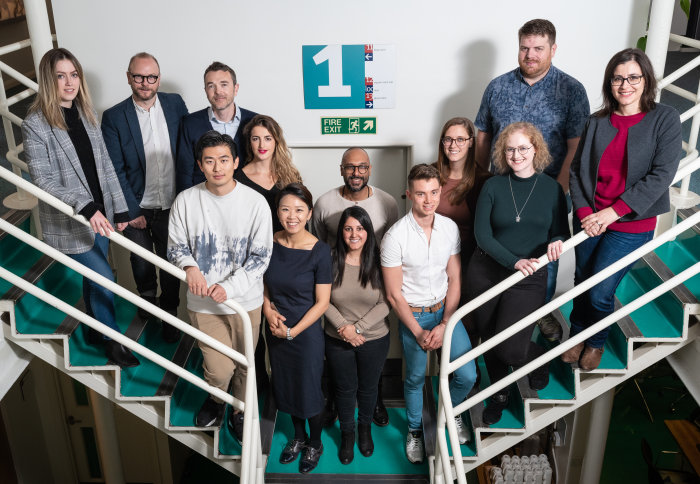Out of the lab: Imperial’s MedTech business accelerator welcomes its next cohort

MedTech SuperConnector - cohort 3
The MedTech SuperConnector accelerator programme has announced a new cohort of researchers who are developing innovations across the medical industry.
MedTech SuperConnector (MTSC) welcomed 11 new participants on to its accelerator programme with technologies ranging from a novel lung therapy trumpet, nanotechnology for bone repair to a home hormone monitoring sensor.
An Imperial-led entrepreneurial training programme for early-career researchers (ECRs), MTSC supports the translation of discoveries into new diagnostic tools, medical devices and digital healthcare solutions.
The programme combines the expertise and resources of eight world-leading institutions to work together to experiment and develop best practice to support academic ventures. It provides ECRs with existing medical technologies with the funding, training and access to industry partners to fast track the translation of their research.
Dr Simon Hepworth, Imperial's Director of Enterprise, said: “MedTech SuperConnector is a shining example of how Imperial brings institutions and industry partners together to translate research into real world benefits. Its experimentation with the accelerator form, and its work to share best practices with the wider higher education sector and external organisations supporting entrepreneurship, demonstrates the College’s leadership and innovation in the entrepreneurship support and tech transfer space.”
Highlights: Success in Industry
Previous participants have gone on to successfully develop their ideas and raise funding. Letizia Gionfrida from the Department of Bioengineering, co-founder of Arthronica, has raised £150,000 from Versus Arthritis for clinical trials in Leeds and Imperial NHS Trusts and a £50,000 musculoskeletal grant from Imperial College London and the Wellcome Trust. Arthronica is an AI platform that predicts musculoskeletal disorders through machine learning and computer vision.
Ms Gionfrida said: “Everything started with the MTSC, it supported my entrepreneurial journey through the programme itself and has continued to support through access to opportunities and the wider ecosystem.”
Fellow Cohort One alumnus Samuel Wilson, in the Department of Mechanical Engineering, co-founder of SERG Technologies, created an unobtrusive wearable system for detecting muscle vibration that generates real-time communication instructions e.g. to direct a prosthetic limb. He was awarded follow-on funding of £78,000 from the Engineering and Physical Sciences Research Council Impact Acceleration Accounts. SERG has secured a pre-seed round of more than £450,000 and has opened offices in London and Athens.
Medical students Woochan Hwang and Alice Tang and PhD student Ekaterina Shatalina, Cohort Two, from the MRC Institute of Clinical Science have incorporated Affect.AI, a digital platform for the analysis of vocal biomarkers for detecting depression, with user trials planned for winter 2020.
Spotlight: the new cohort
Nanotechnology for bone repair

Dr Nuria Oliva-Jorge, Research Associate from the Department of Bioengineering, has developed a novel platform technology for the controlled release of growth factors aimed at healing non-union fractures.
One in ten broken bones will never heal, known as a non-union fracture, are painful and carry a 50% risk of permanent disability. Current methods of delivering growth factors, responsible for stimulating cellular growth and healing, are inefficient and require high doses making these therapies costly and can lead to serious complications. Nuria’s platform technology, TrAPs (Traction force-Activated Payloads), uses DNA nanotechnology that keeps growth factors inactive and protected until cells release them making the delivery more effective and efficient.
Imaging for bone marrow malignancies

Senior scientist Dr Ana Gomes from the Francis Crick Institute is developing a pain-free, non-invasive method to monitor haematological cancer including leukaemia in patients by utilising imaging technologies.
Current methods for diagnosing and monitoring haematological cancer through bone marrow aspiration is invasive, painful, and can lead to complications, which include bleeding and infection. The use of image technology could make the monitoring of response to treatment and chemotherapy resistance along with the long-term monitoring and identification of relapse faster, less stressful and painful for patients.
Smart Textiles: Wearing your Recovery

Laura Salisbury, a PhD student from the Helen Hamlyn Centre for Design at the Royal College of Art, is using smart textiles to facilitate the recovery of upper limb function in stroke survivors.
Laura’s research on brain stimulation techniques integrated within a smart wearable textile has been clinically proven in trials to support improvements in brain function via remaining functional architecture left in the brain. This smart textile technology has the potential to speed up recovery and support the self-administration of rehabilitation whilst maintaining patient’s quality of life.
VUI Diagnostics: Affordable retinal screening

Uddhav Vaghela and co-founder Simon Rabinowicz are both medical students from Imperial College London. Their portable retinal screening device and accompanying software, VUI Diagnostics, can accurately and rapidly produce a digital retinal image, irrespective of operator skill level.
Currently available devices for retinal imaging are expensive, complex to operate, and inaccurate. Their technology bridges the gap in expertise, resource capabilities, and healthcare provision between community healthcare and specialist centres. Removing the need for benchtop machines and under-utilised manual devices currently available their technology unlocks the scope for longitudinal disease monitoring and AI diagnosis, to facilitate the decentralisation of services.
Imperial’s entrepreneurial ecosystem
MTSC is part of Imperial’s expanding ecosystem of entrepreneurship support services that help staff and students turn research into benefits for society. Other initiatives include Techcelerate, aimed at postdocs, and for students WE Innovate, which is currently accepting applications.
Article text (excluding photos or graphics) © Imperial College London.
Photos and graphics subject to third party copyright used with permission or © Imperial College London.
Reporter
Augusta Critchley
Enterprise